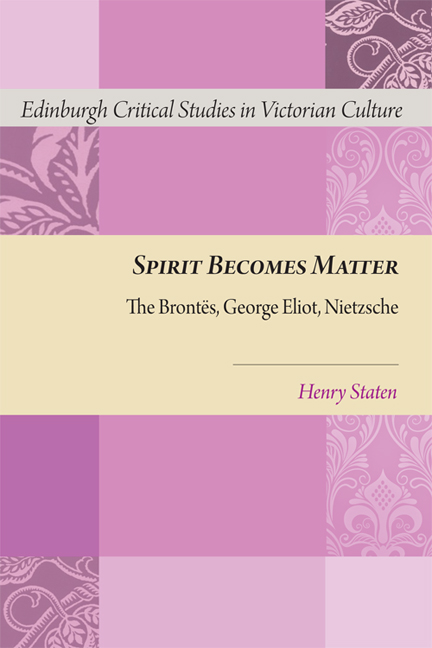Book contents
- Frontmatter
- Contents
- Series Editor's Preface
- Author's Preface
- Acknowledgements
- Dedication
- Introduction
- 1 The Poisoned Gift of Forgiveness (Jane Eyre)
- 2 Subincision of the Ethical Subject (Middlemarch)
- 3 What Things Cost in Middlemarch
- 4 The Return to the Heath (Wuthering Heights)
- 5 Spirit Becomes Matter
- Index
3 - What Things Cost in Middlemarch
Published online by Cambridge University Press: 05 August 2016
- Frontmatter
- Contents
- Series Editor's Preface
- Author's Preface
- Acknowledgements
- Dedication
- Introduction
- 1 The Poisoned Gift of Forgiveness (Jane Eyre)
- 2 Subincision of the Ethical Subject (Middlemarch)
- 3 What Things Cost in Middlemarch
- 4 The Return to the Heath (Wuthering Heights)
- 5 Spirit Becomes Matter
- Index
Summary
Mainstream Middlemarch criticism has always been much taken with the vast social and historical panorama the novel presents. During the 1980s, however, as materialist historicism took hold in literary studies, an impressive cadre of critics, including John Kucich, Daniel Cottom, Deirdre David and Catherine Gallagher, developed the view that Eliot's historical panorama was no more than background for the essential moral drama that was played out in the foreground. Eliot, these critics argued, placed all importance on the moral interiority of individuals, and saw the social context primarily as an impediment to these individuals’ attainment of moral autonomy. There is, thus, in her novels no genuinely dialectical interaction between the socio-political outside and the moral interiority of persons.
Despite the weight and forcefulness of the materialist critique of Eliot, however, much of the best recent Middlemarch criticism has resumed the pursuit of older ‘humanist’ debates in abstraction from the fundamental, ethico-political questions that this critique had raised. These older debates – over the complexity of the real, the problem of interpretive perspective, and the possibility of authentic sympathy – all come back to the question of Eliot's, and her characters’, moral probity as interpreters of reality, leaving untouched the question of the material determinants of these interpretations. While I disagree with the Left interpreters’ summary judgement of Middlemarch as ahistorical, I think their work remains an essential point of reference and disturber of the critical peace. Thus, the argument of the preceding chapter was framed in response to them, to begin showing the dialectical relation between Dorothea's moral evolution and the social outside, and the present chapter is a continuation of this response. In Chapter 2, my argument remained at the level of intersubjectivity. To respond adequately to the substance of the Left critique of Eliot, it remains to show that Eliot also grasped the historico-political context of the psycho-physiologies at the centre of Middlemarch, and did so in a consequentially materialist way.
- Type
- Chapter
- Information
- Spirit Becomes MatterThe Brontes, George Eliot, Nietzsche, pp. 112 - 131Publisher: Edinburgh University PressPrint publication year: 2014



